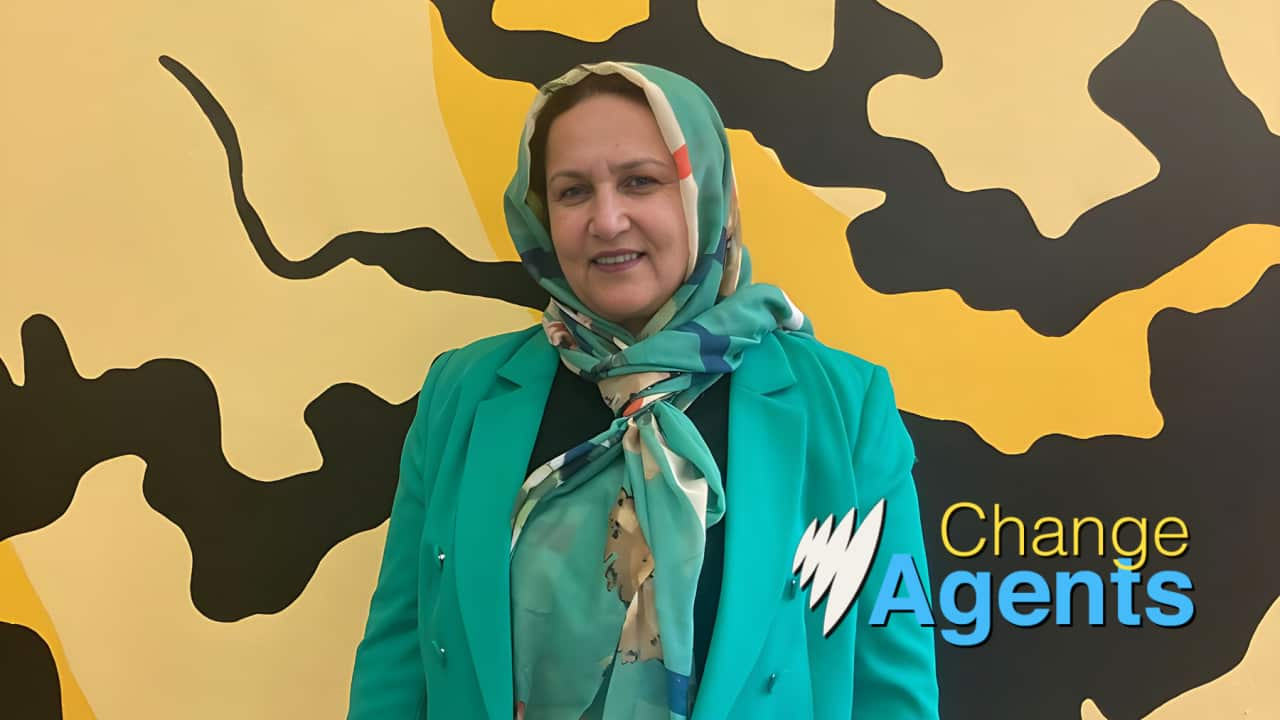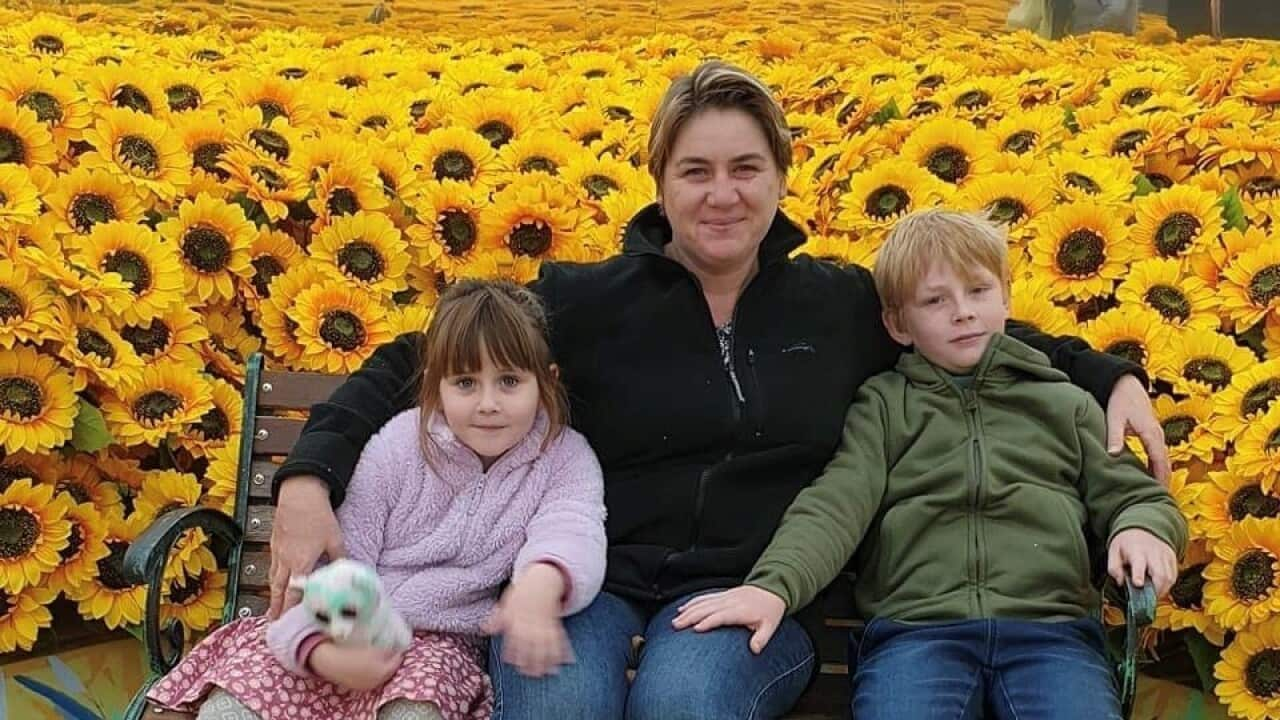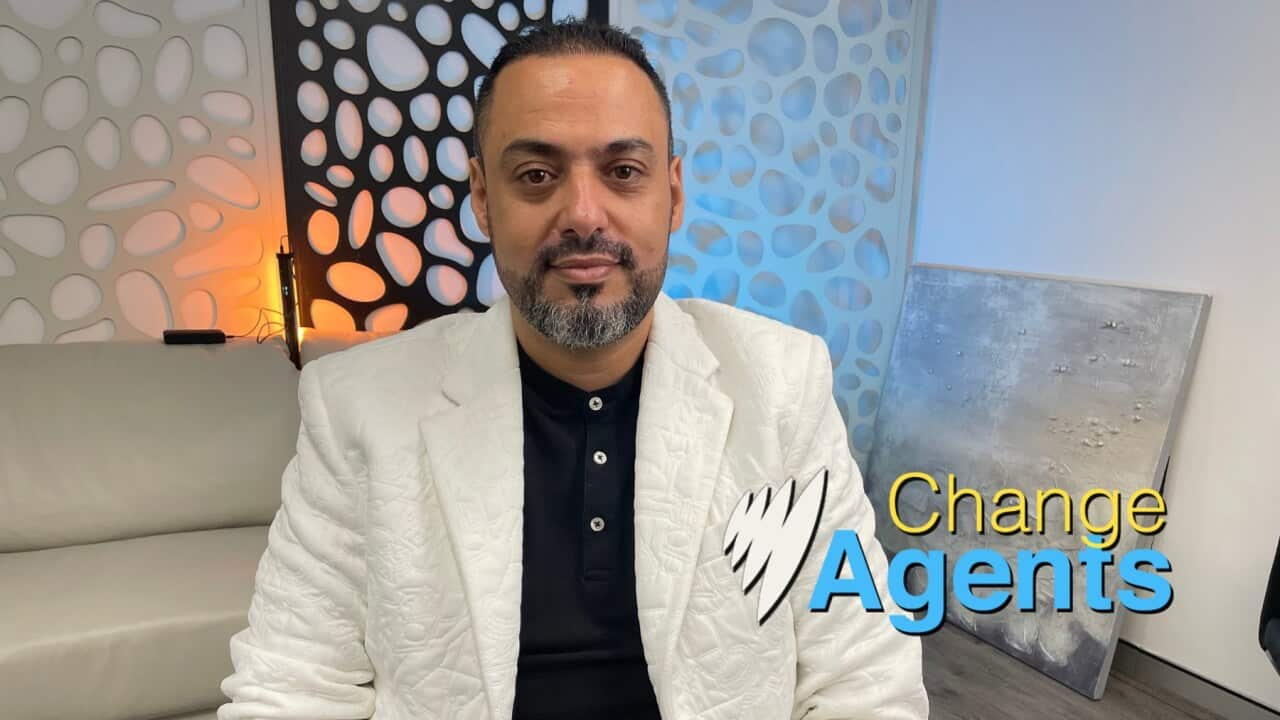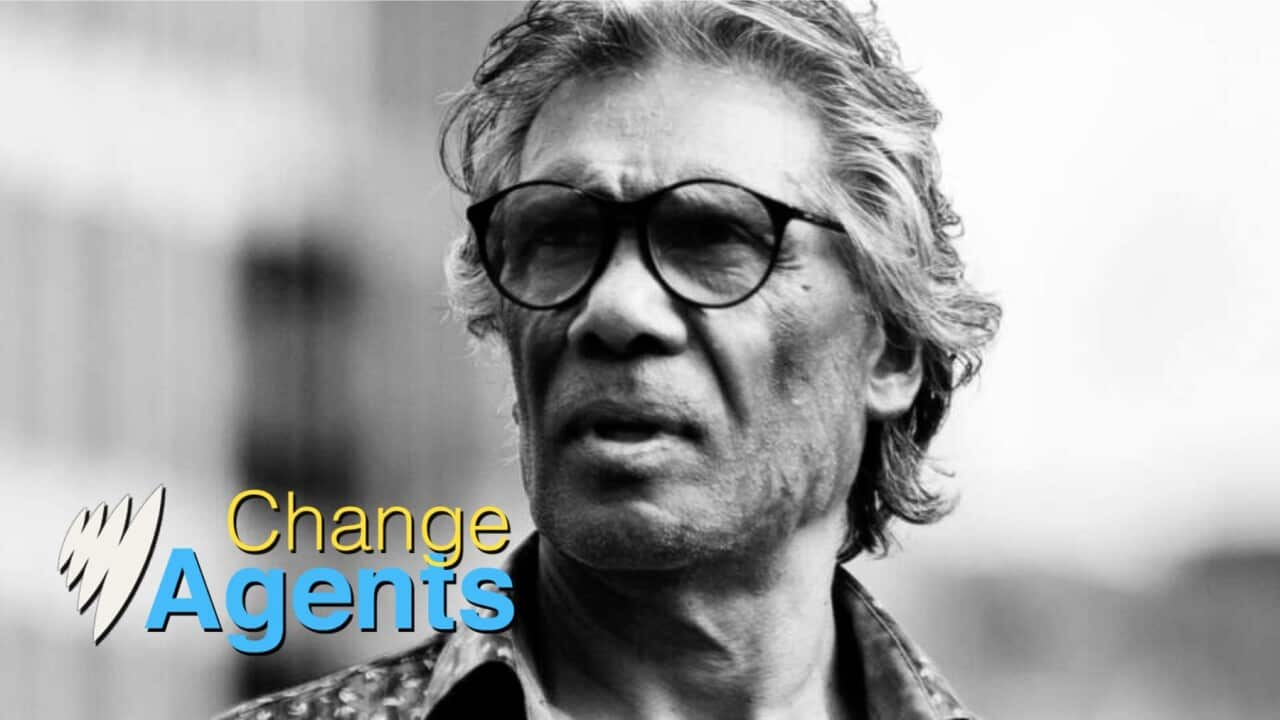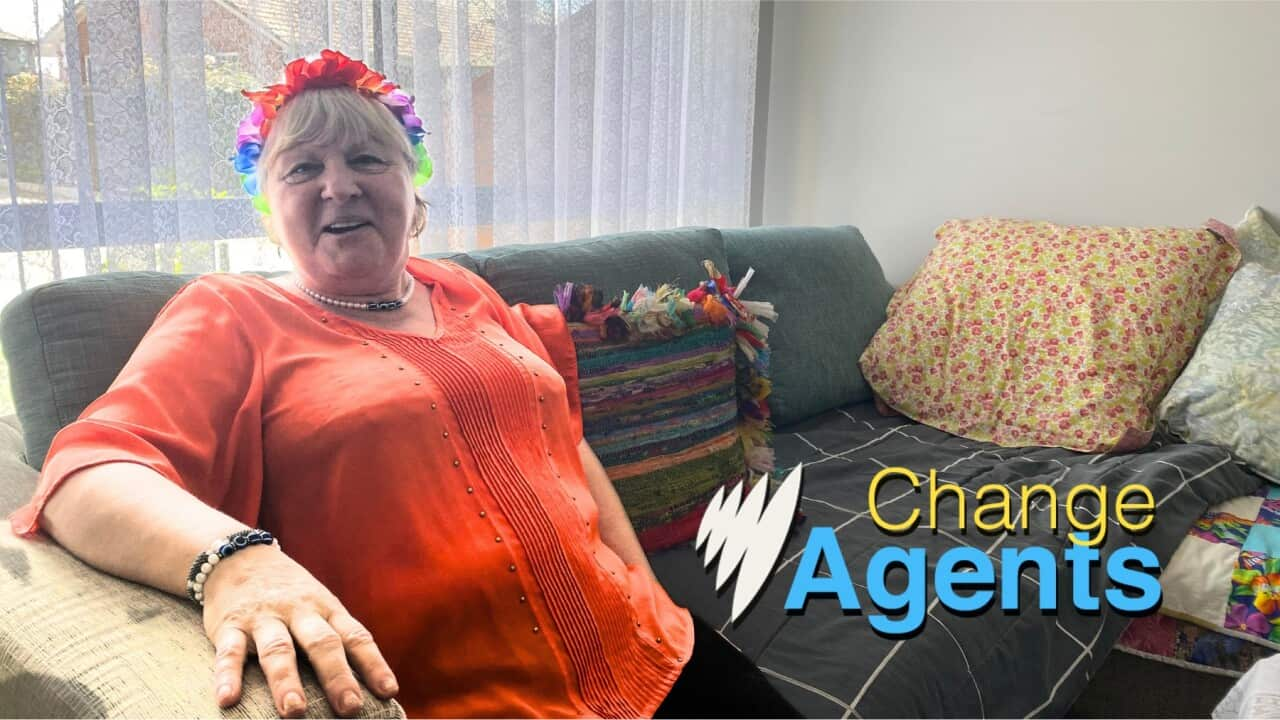TRANSCRIPT
Every Monday, a simple, carpeted meeting room at Arts and Culture Exchange in Parramatta is transformed into a space teeming with colour and lively conversation.
It's where Fariba Rahimi runs a weekly sewing group for women from migrant and refugee backgrounds.
Vibrant, patterned fabrics are strewn across a long table in the centre of the room, and women talk and laugh over the hum of sewing machines.
Originally from Afghanistan, Fariba has been facilitating the sewing group at ACE for the past 4 years.
She says the meetings have become a valuable part of the womens' weeks, as they offer a chance to build skill and knowledge, as well as community, connection and friendship.
“You know, most of the time they're waiting for the Monday to come because they come together and they show their talent and they are happy to make a pants or a jacket or a dress. And I teach them and I guide them in the right way to do and they are so happy. “
The women who attend Fariba's sewing group are from diverse age groups and backgrounds- some are originally from Afghanistan, Iran or Iraq, others from India and Pakistan.
Most live in Western Sydney, and some come with their mothers, aunties or children, others come alone.
Fariba facilitates the group with the support of Yamane Fayed, the producer of the Multicultural Women's Hub at ACE.
Yamane says while it's a diverse group, language differences have not hindered the women's ability to build strong and enduring connections with one another.
"You know, you hear different languages down there in that meeting room. You hear Farsi, you hear Dari. You hear a bit of Urdu and a bit of Tamil now with the new ladies, a bit of Arabic, but they all understand each other they all become like they're creating this friendship network and peer support network to support each other.”
She says Fariba's generosity and warmth, and her dedication to her community makes women feel safe and supported.
“She offers a safe space, a welcoming space. It's more than the sewing itself. I mean the sewing is important, but it's also like feeling like you're coming to your family. It is like a little family in there. She knows all the all the woman stories, all their issues or their joy, their children when they're doing their appointments.”
Fariba's own story- and the series of events that led her to learn and eventually teach sewing- is a one of remarkable personal resilience and strength.
At age 15, Fariba fled Afghanistan to Iran to escape fighting between Afghanistan and the Taliban.
She embarked on this journey to Iran with her three young children, her uncle and a small group of others from her community in Afghanistan's Kapisa province.
Fariba was separated from two of her children while fleeing, and her uncle and two others did not make it past the border between Pakistan and Iran.
“On the border of Pakistan and Iran they killed my Uncle. They shot him. It was it was a horrible time. But yeah we survived, but I lost my uncle and another two drivers, then we went to Iran.”
Living in a refugee camp after she arrived in Iran, Fariba, still only 15, tried to attend school, but because she had no paperwork she was not permitted.
Deeply worried about her two lost children and mourning the death of her uncle, Fariba says she turned to sewing as a means to survive.
“I lost everyone in Afghanistan, family... And then when I was in Iran, I didn't have any choice to survive, you know, the only things I can survive it was sewing.”
At this time, while living in the refugee camp and learning to sew, an opportunity presented itself to Fariba.
Fariba's cousin, who had also fled to Iran, was planning to make the dangerous trip back to Afghanistan.
For Fariba, this was a chance to find her two lost children, and she and her cousin made a pact- in return for a sum of money, Fariba's cousin would try to locate her children and bring them to her.
“He promised me. He said I will go to Afghanistan, if I'm alive, pray for me, and also give me $50,000. 25 Each.”
Fariba agreed, and her cousin left for Afghanistan.
After a year of no news, he returned to Iran.
“After one year of no telephone no letter to send nothing, what I did is I prayed. You know the stars in the sky? I talked to them I said, do you know like, they might be seeing my little my kids. And after one year, he brings me my kids. My life is my kids, Alhamdulillah I have them.”
The year Fariba spent anxiously waiting and praying for the safety of her children, she had started working for a small alterations shop in Iran.
With her children now finally returned to her, Fariba worked multiple shifts a day to pay her cousin the money she owed him.
“Three shifts, I was working. I kept one shift for my kids. And then one shift for my learning. And another shift for my surviving to eat something- bread, most of the time. I you know, put tomato, I opened tomato. I put little salt in it. I put my bread in it and then eat. I survived like that. And I'm happy now.”
Over the next few years, Fariba paid off the debt, and by the time she was 19, had also saved enough to start her own small alterations business in Iran.
Fariba says maintaining her business was a constant struggle, with landlords charging exorbitant rent and Iranian authorities at various points forcing her to close her shop.
She says by this point, however, sewing had become more than a source of income.
“Making dress and like, you know making patterns is my... I don't know if it's a hobby is my time, it's my passion is my, you know, I have like a business, I'm working somewhere, but sewing is in my blood.”
Having developed her own expertise, Fariba had a drive to share her knowledge and passion with others in her community.
Fariba approached United Nations staff working in the refugee camp and offered to work as an interpreter.
Soon, alongside providing interpreting support for those newly arrived in Iran, she began teaching the refugees she met to sew.
Sewing had been a tool of survival and liberation for Fariba, and through teaching, she was able to share this tool with others.
She says her skill had given her an indelible- and often hidden- independence and strength, even in the most oppressive situations.
“A lot of things were going on, but no one can put me down. Because I get up and make a pattern, I make something. They took my money, they took my business but they didn't take my skill. The skill is in my pocket. Inside where no one can find it you know? It's still with me. It's me. It's me.”
And it's this independence and strength that Fariba now continues to nurture in others here in Australia.
20 years ago, Fariba was granted a refugee visa by Australia.
After 10 years living in Iran, she again built a life for herself and her three children in a new place- this time in Western Sydney.
She has taught sewing at community and migrant centres across Western Sydney, at ultimo TAFE, and at ACE in Parramatta with Yamane.
Yamane says the sense of community Fariba builds around her sewing classes has life-changing potential for women who might be struggling with isolation.
“And really it is to fight depression and loneliness because a lot of people unfortunately find themselves as migrants, whether they've been here 20 years... they need to find connection they need to find a community that speaks their language, or they understand their culture. And through this sewing hub, this is what's happening.”
Through nurturing skill and building community, Fariba shares some of her own strength and resilience with the women she works with.
Fariba and Yamane speak about this strength before the other women arrive for the sewing group one Monday morning, discussing the words they might use in Arabic compared with Dari.
Yamane: "I say shujar, because shujar is brave. What do you say, do you have another word?"
Fariba: "We say kbir, like strong."
Yamane: "But is there another word?"
Fariba: "Yes, we say shojar. Strong."
Yamane: "Like shujar! It's the same ! (laughs)”
Fariba likens her own strength to a plant always finding new ways to grow.
Fariba: “I say like, I'm under the rock. I'm just growing from the side of the rock."
Yamane: "Like a plant"
Fariba: Yes, a plant, you know the plant. And then they put a rock on it. Okay? And it could be huge, but I slowly find my way around it, and I'm making myself green.”
And you can feel a sense of shared strength and resilience fill the room, as the women begin to arrive for Fariba's sewing group, chatting happily and pulling fabrics, needles and thread from their bags.
And you can listen to other podcasts in the Change Agents series by or wherever you get your podcasts.
